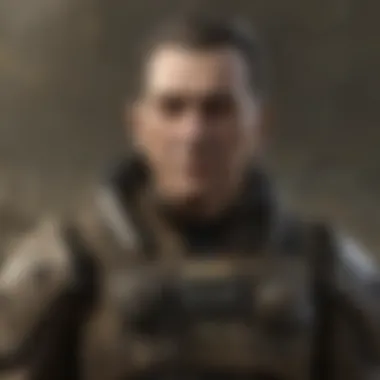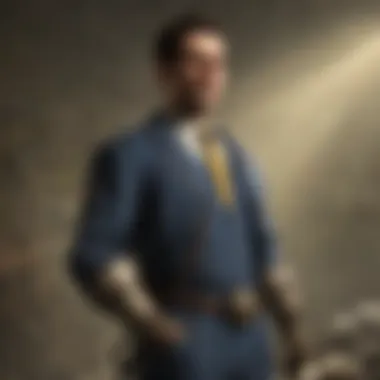Dr. Zimmer: Exploring His Impact in Fallout Lore


Intro
Dr. Zimmer's role in the Fallout universe is a fascinating exploration of morality, technology, and human nature. His character serves as a critical component in understanding complex themes that the series addresses, such as identity, creation, and ethical dilemmas associated with artificial intelligence. Through examining his backstory, interactions, and the choices players face in engaging with him, we can uncover significant layers that contribute to the overall narrative of Fallout.
Lore Insights
Overview of the Fallout Universe
The Fallout series is set in a post-apocalyptic world, showcasing the remnants of a society devastated by nuclear war and its aftermath. With its retro-futuristic aesthetic and alternate history, Fallout blends elements of 1950s Americana with deep philosophical questions about humanity's future. Central to this narrative is the concept of choice, which players navigate throughout their journeys in various wastelands.
Key historical events in the Fallout timeline
- Great War (2077): A pivotal moment that leads to the game's dystopian setting.
- Rise of Corporations: Detailed corporate influence leading to societal breakdown.
- Emergence of Super Mutants and Ghouls: Expands the understanding of mutated life post-nuclear fallout.
- Formation of Major Factions: The Brotherhood of Steel, the NCR, and the Institute have their roles in shaping the world.
Deep dive into the backstory of major factions and characters
Dr. Zimmer is primarily associated with the Institute, a shadowy organization dedicated to scientific advancement at any cost. His role gives insight into the ethical boundaries of science. He operates within a framework of moral ambiguity, posing tough questions to the player. Zimmer's fixation on advanced synth technology reflects wider themes present in the Fallout series, particularly regarding what it means to be human.
Character Analysis
Detailed profiles of iconic characters
Dr. Zimmer: A lead scientist at the Institute. His pursuit of knowledge often supersedes his empathy. He embodies the conflict between ethics and ambition.
Relationships between characters in the Fallout series
Dr. Zimmer’s interactions with synths, particularly his relationship with the character of synths and their creation, create a tension. Players can either align with him and support his controversial methods or defy him in their quest for freedom and autonomy.
Character development and evolution across games
Dr. Zimmer appears in Fallout 3 and expands in Fallout 4. His evolution from a subordinate to a significant figure in the game's moral landscape illustrates the complex narrative threads woven through the series.
"Dr. Zimmer represents the philosophy of utilitarianism, prioritizing outcomes over individual rights."
Fan Theories and Speculations
The narratives around Dr. Zimmer have sparked numerous theories about his potential next steps or a deeper backstory yet to be unveiled. Players often speculate about the nature of the synths and their relationship with humanity, posing questions about sentience and rights.
These theories delve into unresolved plot points, like the potential for further exploration of the Institute in future titles.
End
Prolusion to Dr. Zimmer
Dr. Zimmer occupies a pivotal role in the Fallout series, particularly notable for his complex narrative and thematic implications. This section serves as an entry point into understanding not just his character, but also the broader themes of technology and humanity that are prevalent throughout the series. Analyzing Dr. Zimmer brings forward important discussions that extend beyond the gameplay.
Character Overview
Dr. Zimmer is introduced in Fallout 3 as a member of the Institute, a secretive and advanced organization focusing on technology and cybernetics. He is characterized primarily by his obsession with Synths, artificial beings designed to be indistinguishable from humans. Zimmer's primary role in the storyline revolves around a quest where he seeks his escaped Synth, a character named Harkness. Throughout this quest, players get a glimpse into his motivations and ethical considerations regarding synthetic life.
"The Synths are not mere machines, but beings with a semblance of consciousness and identity."


This view sets the stage for a deeper exploration of the ethics surrounding artificial intelligence, challenging player perceptions of what it means to be human. Zimmer’s portrayal raises questions about autonomy and the rights of synthetic beings, reflecting the game's inclination to blur the lines between human and machine.
Role in the Fallout Universe
In the larger context of the Fallout universe, Dr. Zimmer represents the narrative’s ongoing dialogue about technology’s role in society. His character embodies themes of ambition and the potential dangers of advanced technology, fitting seamlessly into Fallout's post-apocalyptic world where humanity grapples with the consequences of technological endeavors gone awry. By focusing on Synths, Zimmer emphasizes the possibility of evolution in both artificial intelligence and the nature of humanity itself.
Furthermore, Zimmer’s interactions with the player are crucial. Depending on the choices made, players can lean towards supporting or undermining his objectives. This fluidity reflects Fallout’s reputation for player agency, deeply impacting how the story unfolds. Players must navigate moral dilemmas, often eliciting varied emotional responses based on their decisions. Understanding Zimmer's role in this dynamic allows a deeper appreciation of the Fallout narrative, enhancing the gameplay experience.
Origins of Dr. Zimmer
The significance of exploring the origins of Dr. Zimmer is paramount in understanding his character and the overarching themes within the Fallout universe. Through examining his background and the implications of synth creation, the reader gains insights into the motivations behind his actions and the philosophical dilemmas he embodies. This section will provide an analysis of how his beginnings contribute to a richer narrative, emphasizing the human versus technology conflict and the ethical questions that arise from the development of synthetic beings.
Background and Development
Dr. Zimmer is introduced as a character capable of embodying the complexities of human identity in a post-apocalyptic world. Originally depicted as a scientist working for the Institute, Zimmer's character is crafted around a belief in technological superiority over human flaws. His background reveals a man driven by ambition and a relentless pursuit of knowledge. As a top scientist, his work mainly focused on the creation of synths, which are robots designed to resemble humans closely.
In the Fallout lore, Zimmer is depicted as a man of intellect. He has an expertise that extends beyond mere robotics. He delves into areas such as artificial intelligence and the implications of creating conscious beings. This background is crucial in setting the stage for the decisions he makes in the narrative.
Moreover, Zimmer’s character is a representation of a possible future where human creativity and scientific innovation can either uplift or undermine societal values. His journey reflects the dangers inherent in ignoring ethical considerations as progress is pursued blindly.
Creation of Synths
The process of creating synths is both groundbreaking and problematic, and Dr. Zimmer plays a central role in this aspect of the Fallout narrative. Synths are not mere machines; they possess advanced qualities that give them human-like attributes. This raises significant questions about identity and personhood. In Fallout, it is established that the synths' capabilities vary, with some being almost indistinguishable from humans.
The creation of synths indicates a major technological achievement for the Institute. However, the moral implications are profound. Dr. Zimmer’s engagement in this process highlights the ethical responsibilities that come with scientific advancement. The implications of creating life prompts players to reflect on the nature of humanity itself.
"Dr. Zimmer's work with synths challenges players to confront their own perceptions of what it means to be human."
As the narrative unfolds, Zimmer becomes a symbol of the struggle between embracing innovation and recognizing moral boundaries. The themes of control and existence are intricately woven into his character, making his role in the game complex and multifaceted.
In summary, the origins of Dr. Zimmer are essential for understanding his character. The significance of his background is tied closely to the ethical debates surrounding the creation of synths. Analyzing these elements not only brings depth to Dr. Zimmer but also enhances the themes of human versus technology throughout the Fallout universe.
Narrative Function
The narrative function of Dr. Zimmer is critical in understanding the complexities of the Fallout universe. His character serves as a conduit for exploring themes of humanity, ethics, and the intersection of technology and life. The actions and decisions that players make regarding Dr. Zimmer reveal the intricate nature of moral choices in a post-apocalyptic setting. By engaging with his storyline, players confront dilemmas that invoke deep philosophical questions about the essence of being human.
Dr. Zimmer is not just a quest-giver; he embodies the contradictions of a world where synthetic beings, known as Synths, challenge traditional views of humanity. His presence in the game highlights how player agency can manipulate narratives, allowing gamers to explore various outcomes. This adds substantial depth to gameplay and enhances player engagement, making his narrative function a pivotal element in the overall storytelling framework of Fallout.
Quest Involvement
Dr. Zimmer's involvement in quests is a defining characteristic of his role within the series. He presents the player with missions that, while appearing straightforward, delve into layered moral quandaries. Players can choose to assist Zimmer in recovering Synths, which encourages them to evaluate their own relationship with the concepts of freedom and servitude. This questline becomes a reflection of the overarching struggle between creator and creation, making it a compelling narrative anchor within the game.
Character Interactions
With the Player
Dr. Zimmer's interactions with the player are vital to establishing not only the player’s individual narrative but also their connection to the Fallout world. One notable aspect of this relationship is Zimmer's cold, calculating demeanor, which invites players to question his motivations. This confrontation between the player's values and Zimmer's often utilitarian perspective presents a unique challenge. Players must reconcil their own ethics with his, thus influencing the direction of their missions.
The key characteristic of this interaction is Zimmer’s insistence on exploring the morality of synthetic life. His willingness to debate this topic allows for a deeper understanding of the world players inhabit. This interaction is popular among many players, as it makes them reflect on the consequences of their decisions, which is a central theme in Fallout. Ultimately, choosing to side with or against Zimmer can lead to significant plot development, providing both advantages and emotional depth.
With Other NPCs


Interactions with other NPCs through Dr. Zimmer paint a broader picture of Fallout’s society. Zimmer’s complex relationships reveal the spectrum of viewpoints toward Synths, from acceptance to outright hostility. This aspect of his character serves to enrich the narrative, as players see how his actions ripple through the lives of others.
A prominent feature of Zimmer's interactions with other NPCs is the varied responses he elicits based on the player's choices. For example, allies of Zimmer often share his vision of Synth integration, whereas opponents question the ethics behind their creation. This duality contributes to a more nuanced understanding of the game's philosophical undertones. However, this complexity can also present disadvantages, as navigating these interactions requires players to have a keen understanding of the dynamics at play. This impact of Zimmer on other characters helps underline his significance within the broader Fallout narrative.
"Dr. Zimmer’s role challenges players to not only make decisions but to live with the ethical consequences of those decisions throughout the gameplay.”
In summary, the narrative function of Dr. Zimmer is multifaceted. Through quest involvement and character interactions, he embodies the relentless exploration of technology's impact on humanity. Players are invited to consider their choices carefully, defining their path within the expansive world of Fallout.
Philosophical Dimensions
The role of Dr. Zimmer in the Fallout series extends beyond mere narrative function. It invites players to examine complex philosophical themes that resonate throughout the game's post-apocalyptic setting. These dimensions explore the delicate balance between humanity and technology, framing the moral dilemmas that players encounter. This section will delve into the ideas represented by Dr. Zimmer, pressing players to confront uncomfortable truths about identity, autonomy, and ethical responsibility in a world increasingly shaped by artificial intelligence. Understanding these philosophical dimensions elevates the narrative experience, transforming each encounter with Dr. Zimmer into a profound inquiry about the implications of choice and consequence within the game's universe.
Humanity versus Technology
At the core of Dr. Zimmer's character is a fundamental tension between humanity and technology. Zimmer is a scientist who has devoted his life to creating Synths—highly advanced artificial beings designed to emulate human characteristics. His intentions juxtapose the original purpose of Synths against the moral quandaries they create.
In Fallout, the question arises: what does it truly mean to be human? Dr. Zimmer sees Synths as a product of scientific advancement. For him, they represent an evolution of life, yet players must consider the ramifications of such a view. The Synths possess abilities that mimic human behavior, but do they have the same moral standing?
To benefit from this thematic exploration, consider how this tension affects interactions in gameplay. Players choose to sympathize with Synths or view them through the lens of ownership, illustrating divergent opinions about the nature of artificial life.
"The real challenge lies in discerning the line between creator and creation."
This ongoing debate is not merely theoretical; it impacts player choices and the fates of various characters within the Fallout narrative.
Ethical Implications of Synth Creation
The ethical implications of creating Synths cannot be overlooked when discussing Dr. Zimmer. His dedication reflects a broader philosophical inquiry into the responsibilities entailed in scientific exploration. The act of creating sentient life poses critical questions about free will, autonomy, and the potential for suffering.
Synths, as designed by Dr. Zimmer, possess the ability to think and feel—making their existence more morally complex. Players are left to question whether it is right to create life that can experience the world but lacks the rights afforded to human beings. This dilemma raises several considerations:
- Autonomy: Do Synths have the right to choose their own destinies?
- Suffering: What happens when a created being can experience pain or loss?
- Responsibility: As their creator, is Dr. Zimmer accountable for the lives he has made?
In this narrative, the ethical quandaries reflect larger societal issues regarding technology and its impact on humanity. Players may grapple with these themes throughout the gameplay, fostering a richer understanding of both the character and the world they inhabit.
The unavoidable tension between creation and moral responsibility enhances the thematic fabric of the Fallout universe, and Dr. Zimmer serves as the embodiment of these pressing ethical questions.
Player Agency and Choices
Player agency in the Fallout series is a crucial element that shapes the player experience. In the context of Dr. Zimmer's character, this agency is not only about making choices but also understanding the ramifications of those decisions. Within the narrative, Dr. Zimmer presents a moral quandary that players must navigate, particularly when they engage with his objectives and the Synths he has created.
Consequences of Interactions
The interactions with Dr. Zimmer often lead to significant consequences, affecting both the player's journey and the game world. When players choose to assist him in recovering a runaway Synth, they must consider the ethical implications of their actions. Supporting Zimmer can result in creating a rift between factions, such as the Railroad, who protect Synths from being exploited. If a player embraces Zimmer’s agenda, they may also gain technological resources or information, but these benefits often come at the cost of a moral compromise.
- Allegiances: Choosing to side with Dr. Zimmer can solidify a player's stance with the Institute, impacting future character relationships.
- Reputation: Associating with Zimmer may alter the player’s reputation among various factions, which in turn can lead to different responses from characters in subsequent interactions.
- Gameplay Dynamics: The consequences can alter gameplay dynamics, shaping encounters and resource availability as players progress.
Ultimately, each decision connects deeply with the narrative, compelling players to weigh their morals against their immediate goals.
Multiple Endings
The presence of multiple endings in Fallout enhances the significance of player choices. Dr. Zimmer plays an integral role in shaping these outcomes. Depending on the player's decisions regarding him and the Synths, different conclusions can emerge.


- Supporting Zimmer: If players fully support Dr. Zimmer’s objective, they may witness a version of events where the Institute’s ideology prevails. This path can solidify the Institute's power and dominance over Synth technology.
- Opposing Zimmer: Conversely, if players choose to rebel against Dr. Zimmer, by helping Synths escape or siding with the Railroad, they can lead to a narrative that champions the freedom of Synths, promoting an alternate vision for the future.
The variety of endings not only enriches the gameplay experience but also forces the player to confront the complexities of freedom, control, and the implications of their choices throughout the narrative.
"Player agency transforms every encounter into a meaningful decision, shaping the very fabric of the game's story."
Critiques and Reception
The analysis of Dr. Zimmer is incomplete without examining the critiques and reception of his character within the Fallout community. This section emphasizes the importance of understanding how players view Dr. Zimmer, as their reactions shape the narrative landscape and influence future game designs. Evaluating the reception provides insights into the complexities of character development in video games. It illuminates how narratives are perceived, dissected, and discussed among fans, which in turn can create a feedback loop that affects game developers.
Player Reactions
Player reactions to Dr. Zimmer span a wide spectrum. Some players appreciate the depth of his character, recognizing the moral dilemmas he presents regarding the synthesis of technology and humanity. His role resonates with players who engage deeply with the ethical implications of creating life forms like Synths. Others, however, criticize him for his cold demeanor and the moral quandaries surrounding his actions. Many players express frustration towards his character, especially when they perceive him as representing oppressive tendencies in the quest for control.
Feedback from online communities such as Reddit reveals that discussions often focus on how players feel about Zimmer's motivations. Some appreciate the complexity he brings to the narrative, while others feel he lacks empathy, leading to a disconnect. This duality of reaction showcases how his character can serve as a catalyst for larger dialogues about agency, ethics, and the implications of advanced technology in a post-apocalyptic world.
Impact on Game Narrative
Dr. Zimmer’s presence in the Fallout series significantly impacts the overarching game narrative. He represents a crucial intersection of human interaction and technological progress, making viewers rethink their decisions as players through his quests. His questline, involving the search for a runaway Synth, acts as a crucial narrative tool that invites players to reflect on what it means to be human.
Moreover, Zimmer influences key themes like ownership, free will, and the impact of artificial life on the remnants of humanity. By serving as an antagonist of sorts, he challenges players to evaluate their moral standing.
"Dr. Zimmer acts not just as a character but as a lens through which the player must confront their own choices and beliefs about the nature of change and obligation."
Dr. Zimmer's Legacy
Dr. Zimmer's legacy in the Fallout series is profound. He encapsulates the ongoing struggle between humanity and technology, serving as a pivotal character across multiple narratives. As players engage with Dr. Zimmer, they encounter themes that challenge their perceptions about the nature of existence, choice, and moral ambiguity. This section highlights several critical facets of his legacy, demonstrating the multilayered significance of his character in the broader context of the Fallout universe.
Influence on Future Installments
Dr. Zimmer's presence and the ethical dilemmas he embodies have undoubtedly influenced later installments of the Fallout series. His approach to synthetic life forms sets a precedent that resonates through the narratives of subsequent games.
- Character Development: Characters introduced after Dr. Zimmer, like the Institute's leaders in Fallout 4, echo his motivations and conflicts. The introduction of more complex AI-driven quests reveals how fundamental his example was in shaping character arcs.
- Narrative Themes: Future narratives continue to probe the questions of identity and autonomy. Players may notice parallels in decisions made in games like Fallout 76 or Fallout 4, where the conception of synthetic life becomes a major plot element. The ethical discussions surrounding synths persist, providing cohesion across the franchise.
Cultural Impact
The cultural impact of Dr. Zimmer extends beyond the games themselves. His character has sparked conversations among fans and critics alike, creating a multifaceted discourse around the implications of artificial life.
- Fan Discussions: Dr. Zimmer often becomes a subject of analysis in forums like reddit.com, where players debate the implications of his choices. Such discussions contribute significantly to the ongoing evolution of game narratives and character complexity.
- Inspiration for Other Media: The themes brought forth by Dr. Zimmer have also inspired various creators outside the Fallout ecosystem. Literature, television shows, and academic papers have explored the moral complexities that arise from advanced technology. His character represents a foundational pillar in the larger conversation about AI ethics.
In summary, Dr. Zimmer's legacy is not just a footnote in the Fallout series. It shapes future narratives and encourages cultural discussions that transcend the boundaries of gaming. The emotional resonance and philosophical inquiries he provokes continue to challenge players and critics, ensuring his role remains vital within both the game and the broader cultural landscape.
Closure
The conclusion is a vital component of this article as it distills the complex narrative surrounding Dr. Zimmer. Throughout the exploration, various dimensions of his character have revealed significant insights into his role in the Fallout universe. Summarizing the findings enables readers to grasp how Dr. Zimmer serves as a mirror to the larger themes of identity, morality, and technology. His interactions and the choices posed to players are not merely background mechanics; they carry weight that affects the emotional landscape of the game.
Summary of Findings
Dr. Zimmer stands out as a pivotal character within the Fallout series. His creation of synths raises questions about the essence of humanity and artificial life. Players encounter him as a figure of authority, yet his motivations reveal flaws and contradictions that challenge the player's perceptions.
In examining his influence on player agency, it becomes clear that choices made in his presence can lead to varied conclusions, emphasizing the consequences of one's actions within the game. His philosophical layers inspire deep reflection on moral choices, particularly in the context of creating life.
Final Thoughts
Dr. Zimmer's character serves as a profound commentary on the implications of scientific advancement and ethical responsibilities. He embodies the delicate balance between creator and creation, prompting players to confront their own values. The aftereffects of player decisions regarding Dr. Zimmer resonate throughout Fallout, leaving a lasting legacy that influences future narratives in the series.
As the Fallout franchise continues to evolve, Dr. Zimmer will remain a figure of interest for both players and scholars alike, encapsulating the intricate relationship between humanity and technology in storytelling.







